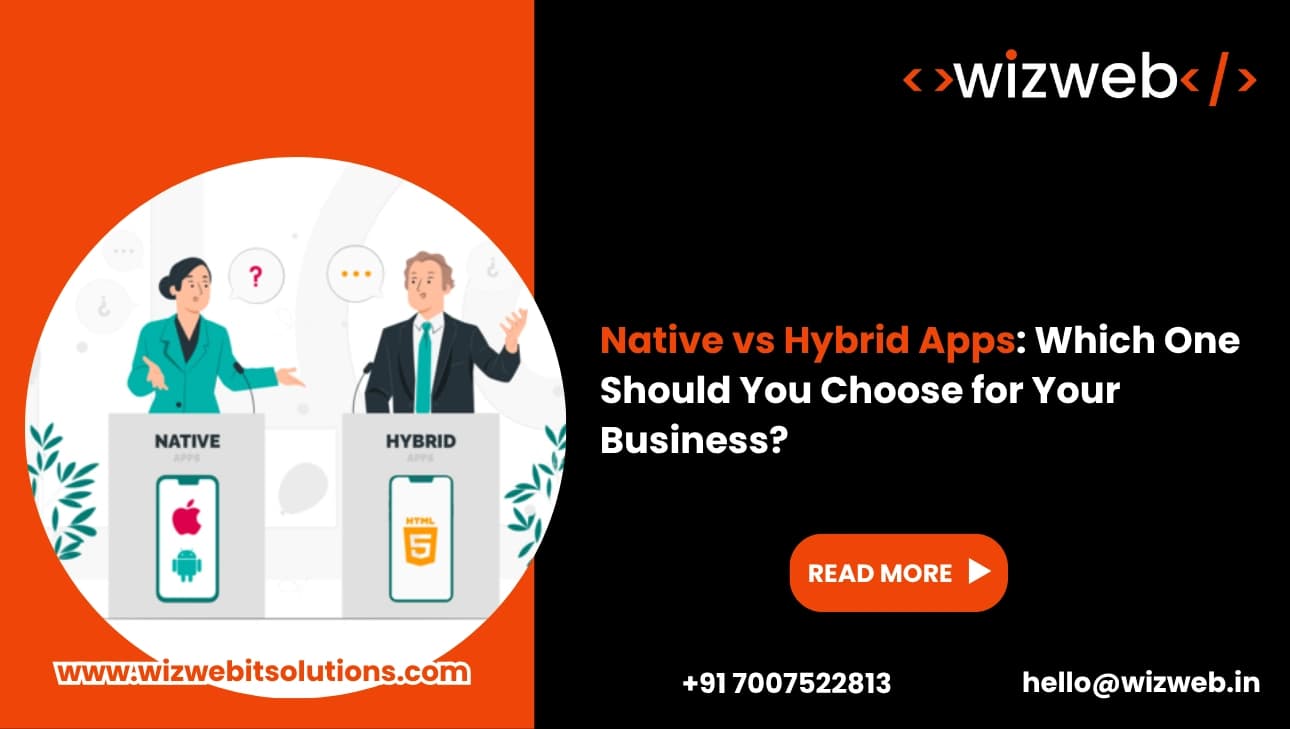Get in Touch
- Phone
+91 700 752 2813
- Email Now
hello@wizweb.in
Office No - 204 A-140, Sector 63 Road Noida, Uttar Pradesh 201301

In today’s digital world, almost every business wants a mobile app. Whether you run a small online store, a restaurant, or a big company, having a mobile app helps you reach more people, serve your customers better, and grow your brand. But before you build an app, there’s a very important decision to make — Native vs Hybrid Apps.
This is where many business owners get confused. You may hear developers talk about these terms, but they often sound too technical. Don’t worry. In this blog, we’ll explain everything in simple English so that even if you are not from a tech background, you will understand clearly what Native and Hybrid apps are, how they are different, and which one is the best for your business.
Native apps are mobile applications that are built specially for one platform — like Android or iOS. Developers use different tools and languages for each platform. For Android, they use Java or Kotlin. For iOS, they use Swift or Objective-C.
Since native apps are created to work only on one type of device, they give better performance and a smoother user experience. These apps can use all the features of your phone such as the camera, microphone, GPS, contacts, and more without any problem.
Hybrid apps are a mix of web apps and native apps. They are built using web languages like HTML, CSS, and JavaScript, and then wrapped in a native container. This allows them to run on both Android and iOS using a single codebase.
You can think of a hybrid app as a website packed into a mobile app. It looks like a native app to the user but runs in a web view in the background.
Now that we understand both types, let’s compare Native vs Hybrid Apps more clearly. This will help you decide what fits your business needs best.
| Feature | Native Apps | Hybrid Apps |
| Platform | Only one (iOS or Android) | Both iOS and Android with one code |
| Performance | Very fast and smooth | Slower for heavy apps |
| Development Time | Longer | Faster |
| Development Cost | Higher (2 apps) | Lower (1 app) |
| User Experience | Best | Good but not perfect |
| Device Feature Access | Full | Partial or limited |
| Maintenance | Needs separate updates | Easier with single update |
From the table above, you can see that Native Apps are best when you want top performance and access to all device features. On the other hand, Hybrid Apps are ideal when you want to save time and money, especially if the app is not too complex.
There’s no one right answer. Your choice between Native vs Hybrid Apps depends on your goals, budget, and the type of app you want.
This is where expert Mobile App Development Services can help you. A professional app development company will look at your business goals and suggest the right solution. They will help you understand what your users expect and build the app that suits your needs.
Building an app is not just about writing code. It includes planning, designing, testing, launching, and even updating the app after it is live. That’s why hiring a company that offers Mobile App Development Services is important.
Such companies help you:
With the help of good developers, your app can turn your idea into a powerful tool for your business.
Deciding between Native vs Hybrid Apps is one of the first big steps in your app journey. Think about what’s more important to your business — performance or cost, speed or features.
If your app needs to do a lot, and you want the best performance, Native Apps are the better option. But if you want something fast, affordable, and easy to manage, Hybrid Apps can be a smart choice.
Whatever you choose, always keep your users in mind. A good app should be easy to use, fast, and solve a real problem for your audience. And with the right Mobile App Development Services, your business will be ready to grow in the mobile world.